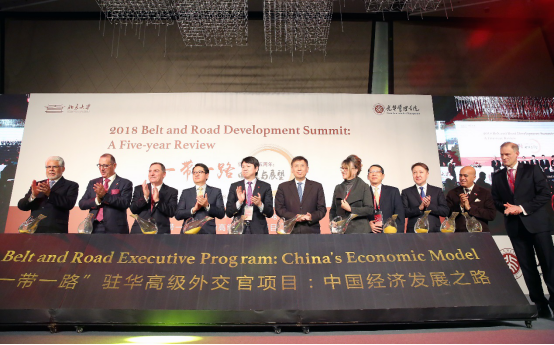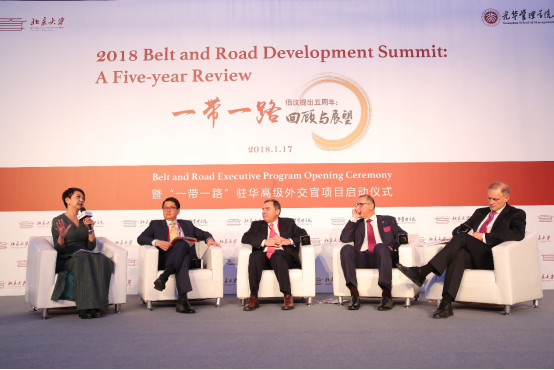January 17, 2018 (Beijing, China, InterContinental Hotel) –Peking University Guanghua 2018 Belt and Road Development Summit attracted 200 industry leaders, prominent academics and senior government officials from over 36 countries across the globe to discuss the economic and development potential of the countries along the Belt and Road.

The summit provided in-depth insights from successful Belt and Road projects over the past five years, in order for attendees to explore ways, in which his/her country or firm can strategically leverage the initiative for mutual gain.

The summit is also the opening ceremony for the newBelt and Road Executive Program for Senior Diplomatsthat will be held over the next few days and in March. The program provides senior government officials with an insider’s view of China’s economic miracle- focusing on the practical lessons, strategies and business models that have lead to China’s 40 years of rapid economic success. The first cohort comprises 50 senior diplomats from 36 different countries around the world.

Guanghua’s Dean LIU Qiao expressed the importance of China’s Belt and Road Initiative (BRI) for promoting regional economic development for countries along the Belt and Road, as well as the positive impacts the initiative will have on the greater global economy. Prof. LIU Qiao said, “This summit truly embodies the vision of China’s Belt and Road Initiative. The attendees for today’s summit play an important role in realizing the Belt and Road Initiative going forward.”
The summit itself was organized into four keynotes and one panel discussion: Keynote I: Belt and Road Initiative: Review and Outlook; Keynote II: Belt and Road Initiative and Global Governance; Keynote III: Silk Road Fund and Belt and Road Initiative; Keynote IV: China’s Development Model and the Implications for the New Era of Globalization; and Panel Session I: Enhancing Cross-sector Connectivity along the Belt and Road.
For each session, the forum featured an impressive line-up of speakers from Chinese and foreign senior government officials to prominent industry leaders.

During Keynote I, “Belt and Road Initiative: Review and Outlook,” ZHANG Xiaoqiang, Executive Vice Chairman and CEO of the China Center for International Economic Exchanges, discussed the aim and scope of the Belt and Road Initiative. In his keynote address, he emphasized the BRI’s role as “an important foundation for coordination and mutual economic benefit.” In this regard, the BRI primarily focuses on three types of cooperation: (1) technological, (2) resource, and (3) financial.
Over the past five years, China’s BRI has been quite successful in these three types of cooperation with major projects, such as the light rail in Kenya, the Thailand Railway Project, which was launched this past month, and a number of other major projects in the Belt and Road’s 65 participating countries. In fact, such projects have created 200,000 jobs in those countries and provided mutual economic benefits. ZHANG pointed out that the connections between countries, technology, trade and people have been strengthened by the initiative and this, in essence, is the spirit of the Belt and Road. In short, “everyone can play a constructive role” in the development of the Initiative for mutual benefit.

During Keynote II, “Belt and Road Initiative and Global Governance,” HE Yafei, Former Vice Minister of the Ministry of Foreign Affairs, discussed how the Belt and Road Initiative can help global governance “move in a fairer, more just, and more equal direction.” In his keynote, HE pointed out that the BRI addresses two key challenges facing global governance today: (1) lack of new engines of economic growth and (2) geo-political imbalance.
HE attributes the current “rising tide of anti-globalization” to (1) the widening gap between rich and poor and (2) geo-political imbalance. However, he emphasized that countries should resist saying “me first” and focus on collaborative efforts. As he put it, “we live in an interdependent world, a connected world.” The BRI is a significant part of attempting to promote such collaborative efforts.
Yet, China still has a long way to go, as building trust among potential collaborating countries is essential in moving forward. HE is confident for the future and believes that the BRI is not only a “reflection of China’s deeper involvement in global governance,“ but also “represents the aspirations of all of us to make the world a better place. “

DuringKeynote III, “Silk Road Fund and Belt and Road Initiative,”LIU Zhengming, Managing Director of the Silk Road Fund, discussed the fund’s supporting financial role in the Belt and Road Initiative. As LIU put it, “the Silk Road Fund is not an aid organization, but rather promotes financial collaboration between countries and invests in mid to long-term projects.”
During the establishment of the fund, China already allocated 40 bn USD in order to support BRI projects and, this past May, Chinese President Xi Jinping announced another 100 bn USD to the fund. With this increased financial support, the fund is in even better position to provide funding for the initiative.

During thePanel Session, “Enhancing Cross-sector Connectivity along the Belt and Road,” the panelists drew from their countries own role within the Belt and Road Initiative to discuss the BRI’s global implications.
Stanely Loh, the Ambassador of the Republic of Singapore to the P.R.C., discussed Singapore’s unique role as the BRI’s financial hub for South and Southeast Asia. As an early supporter of the BRI, Singapore manages a large number of funds going to the region and is one of the top ranked recipients for both inbound and outbound investments for the BRI.
At the “epicenter of Chinese-Greece relations is the Belt and Road Initiative,” said Leonidas Rokanas, Ambassador of Greece to the P.R.C. Currently, Greece’s BRI focus and positioning centers around its national maritime advantage.
Israel,Zvi Heifetz, Ambassador of the State of Israel to the P.R.C, serves as an important innovation partner for the Belt and Road. It is also a key link between East Africa and Europe.
Poland’sWojciech Zajczkowski, Ambassador of the Republic of Poland to the P.R.C, discussed its role as an important connecting point between China and Europe and its promotion of the BRI’s connectivity and cooperation.
Finally, as Greece’s Leonidas Rokanas, Ambassador of Greece to the P.R.C, summarized, “the BRI is a network in which cultural, technology, trade, etc. passes through. If we collaborate jointly in this initiative, then the BRI will be sustainable.”
Prof. LIU Qiaodelivered the closing thoughts in his keynote on “China’s Development Model and the Implications for the New Era of Globalization.” In his keynote, he discussed how China’s growth model can help address current global challenges and serve as a reference for the rest of the world, especially for BRI countries. While Prof. LIU pointed out that the BRI is not a dominant solution, it is “a platform for all countries to collaborate and find solutions to global challenges.”
About Peking University, Guanghua School of Management: Peking University, Guanghua School of Management is a leading business school in the Asia-Pacific renowned for its China-expertise and international perspective. Guanghua offers a comprehensive business education with programs including, undergraduate, graduate, doctoral, MBA, Executive MBA and executive education programs. Guanghua has a global network of over 30,000 alumni working across industries for leading domestic and multinational corporations. It also has over 100 partner institutions across the globe. In addition to its main campus in Beijing, Guanghua has campuses in Shanghai, Shenzhen, Xi'an and Chengdu and is actively engaged in policy making and economic development in China.
Full list of speakers (in order of appearance):
·ZHANG Xiaoqiang, Executive Vice Chairman and CEO of China Center for International Economic Exchanges and the former Vice Chairman of the National Development and Reform Commission
·HE Yafei, Former Vice Minister of the Ministry of Foreign Affairs
·LIU Zhengming, Managing Director of the Silk Road Fund Co., Ltd.
·Moderator: TIAN Wei, Host & Moderator of “World Insight with Tian Wei” on CGTN
·Stanley Loh, Ambassador of the Republic of Singapore to the People’s Republic of China
·Leonidas Rokanas, Ambassador of Greece to the People’s Republic of China
·Zvi Heifetz, Ambassador of the State of Israel to the People’s Republic of China
·Wojciech Zaj?czkowski,Ambassador of the Republic of Poland to the People’s Republic of China
·LIU Qiao, Dean and Professor of Finance, Peking University, Guanghua School of Management
For more information, please contact Guanghua’s Assistant Director of External Relations, Ms. Huanran (Rita) Wang:
Email:wanghr@gsm.pku.edu.cn
Phone Number:+86 01 6274-7175
 Programs
Programs